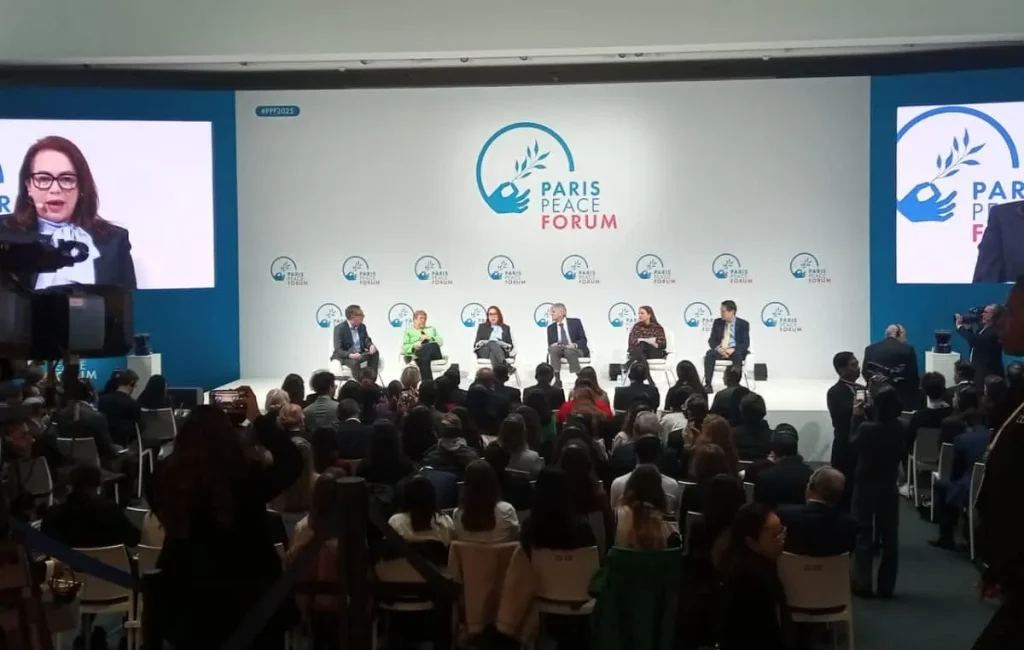As the curtains fell on the 8th Paris Peace Forum (PPF2025) at the iconic Palais de Chaillot, the air buzzed not with rhetoric, but results. Over two electrifying days under the banner “New Coalitions for Peace, People & the Planet”, 15+ heads of state, 25 ministers, 500 speakers, and 4,000 participants forged tangible commitments amid Ukraine’s grind, Gaza’s despair, and AI’s double-edged sword.
Justin Vaïsse, Founder & Director General, nailed it at the close: “The word that embodies the Forum is impact. In a brutalized world, we don’t just analyze – we act.” Day 2 spotlit AI governance, Great Lakes stability, humanitarian law, and COP30 prep – proving multilateralism isn’t dead; it’s evolving.
“This is not a talk shop. This is an action platform.” — Justin Vaïsse, Founder & Director General, Paris Peace Forum (Closing Press Conference, Oct 30)
A $100 million war chest emerged from the two-day summit, with France pledging €10 million to the International Fund for Public Interest Media (IFPIM) and Ghana becoming the first African nation to contribute, adding $3 million to protect independent journalism in conflict zones. A North-South methane reduction coalition, spearheaded by French President Emmanuel Macron and Barbados Prime Minister Mia Mottley, gained momentum with commitments from Brazil, the UAE, and others — setting the stage for a major push at COP30 in Belém next month.

But the real breakthrough came in the Great Lakes region, where a ministerial conference co-chaired by France and Togo — the African Union’s designated mediators — mobilized over $50 million in emergency aid and investment for eastern Democratic Republic of the Congo. The session fused humanitarian relief with long-term economic integration, including plans for a Goma–Kigali rail corridor and refugee return frameworks, all tied to ongoing U.S., Qatari, and AU mediation efforts.
“This is the first time since 2013 that we’ve seen a joint North-South framework explicitly linking trade to peace compliance,” said one senior UN official present. The result: the Paris Declaration on Great Lakes Prosperity, a roadmap diplomats are already calling a potential game-changer.
Artificial intelligence dominated Day 2, with global leaders, tech giants, and child protection experts converging on one urgent truth: AI can prevent atrocities — or accelerate them.
In a packed session, Yoshua Bengio, co-president of LawZéro and a pioneer in AI safety, joined Jacinda Ardern, former New Zealand Prime Minister and chair of the Christchurch Call, and Microsoft’s global AI policy director Nicholas Butts to unveil the Global AI Safety Compact — a 12-nation agreement requiring pre-deployment testing for radicalization risks.
“AI is a preventive tool,” Ardern warned, “but it can also supercharge pathways to extremism. We need shared red lines — now.”
In a parallel panel, UNICEF, Sesame Workshop, and OpenAI launched the Digital Childhood Framework, banning hyper-realistic AI companions for children under 13. “The more human-like AI appears,” said Mathilde Ceroli of everyone.ai, “the greater the risk of emotional dependence. We have a duty to build responsible experiences.”
Humanitarian law took center stage as the world marked the 75th anniversary of the Geneva Conventions. International Committee of the Red Cross President Mirjana Spoljaric-Egger, flanked by French Foreign Minister Jean-Noël Barrot and Spanish Foreign Minister José Manuel Albares, expanded a September 2024 initiative from six nations to 22, launching the Paris IHL Compact.
“The first steps toward peace are always humanitarian,” Spoljaric-Egger told the audience. “We must treat every human life as human — no exceptions, no matter the side.”
The compact introduces real-time war crime monitoring using satellite imagery and AI — a direct response to ongoing violations in Ukraine, Gaza, and Sudan.
The forum’s most anticipated moment came during the closing ceremony: the announcement of 10 Scale-Up Projects (SCUP) selected for full support in 2026. Chosen from 30 finalists in the 2025 Call for Solutions, these initiatives will receive funding, mentorship, and diplomatic backing to scale globally.
Winners:
- AI Sentinel for Atrocity Prevention (LawZéro, Canada) — early-warning systems for conflict zones.
- Congo Basin Green Rail (AfriConnect) — $1.2 billion trade corridor for peace.
- ChildShield AI Filter (UNICEF + OpenAI) — global standard for child-safe AI.
- IHL Compliance Dashboard (ICRC) — live tracking of war crimes in 50+ countries.
Since 2018, the SCUP program has mobilized $2.8 billion and engaged 120 nations — making it one of the most effective innovation-to-policy pipelines in global governance.
Gaza, Sudan, and youth also had their moments. A session on Israeli-Palestinian diplomacy reaffirmed France’s recognition of Palestine and called for a civil society–led “Paris Call 2.0”. A minute of silence honored Sudan, followed by a youth-led panel on peacebuilding. “The future doesn’t inherit peace,” one Sudanese activist said. “It builds it.”
As the lights dimmed at the Musée de l’Homme, Vaïsse looked ahead. “We don’t wait for permission,” he said. “We build coalitions, fund solutions, and force progress.”
The Paris Peace Forum 2025 didn’t just discuss the world’s crises — it began to solve them.
The next edition, already in planning, will focus on “AI for Peace: Governing the Ungovernable” — and the world will be watching.



